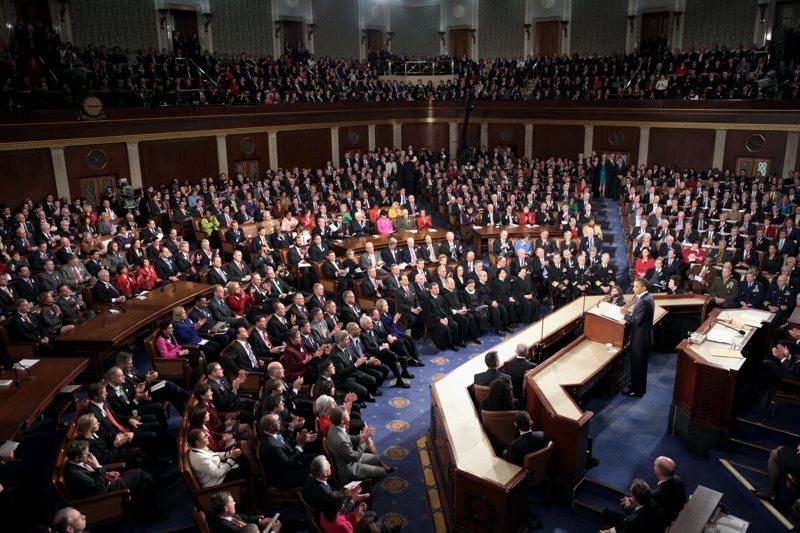Neuendorf: State of the Union is necessary
Nuendorf believes that the State of the Union will encourage viewers who know little about politics to dig deeper in order to become more involved and more informed.
February 4, 2014
Last Tuesday, President Barack Obama presented his fifth State of the Union to Congress and the nation — but of course you knew that; it was impossible to escape the media frenzy surrounding it.
I am not going to sugar coat my knowledge when it comes to politics. I am more or less a fool. Most likely, I am ignorant to some people’s standards, but that being said, I am keen enough on the issues that affect me to form an opinion and be able to defend it. But when it comes to the mechanics, the ins and outs of the government, I am not confident on the who, what, when and why of the system. And that is how the State of the Union makes me feel informed and participatory for one night a year.
The media hype preceding and succeeding the State of the Union was, and always will be, self-serving; the news stations pandering for America to tune into the president’s determining hour because the rest of 2014 lingers on tonight’s proposals. So, yeah, the State of the Union is not as important or life changing as the media wants to lead us to believe. On the other hand, there are cynics who believe the entire event to be pointless.
Since the modern State of the Union style was created back with Woodrow Wilson, there has been an established, formulaic approach on how to address the entire nation without ruffling too many feathers yet still appear ambitious and productive. It only takes two or three State of the Union viewings and an adequate attention span to get a feel for the equation. First, the president kicks off the show by praising America and all it has accomplished in a year, highlighting the potential for future prosperity.
Before the admirations start sounding contrived, the president will direct our attention to the issues he sees as threatening — or maybe just the issues the public wants or expects to hear. This is the portion of the show where the president will propose what he is willing to do to confront and battle these issues, being more optimistic than realistic. Finally, the president will cap it off by asking for the country’s empathy by pinpointing a singular story of courage and the unbendable American spirit. Sprinkled throughout are thunderous applauses from the president’s party and silent disapproval from the opposing.
Despite the ritual, each year offers a few standout points worthy of consideration, and this year, President Obama’s assertiveness was refreshing.
Erin Heckroth, freshman in Political Science, said, “Ever since 2009, I’ve watched President Obama plea for the cooperation of Congress. But this year was different. He stated his approach of using the executive action to get things rolling in Washington. I am interested in seeing if and how he will use this and its effect on the American people.”
Besides embracing executive action, other flashy bits included Obama’s determination to raise minimum wage to $10.10 an hour, his disgust with the gender pay gap and his appeal to provide more help to young men of color.
The predicted cheers from Democrats and indifference from the Republicans promptly symbolizes the dysfunction with Congress. Each State of the Union possesses an unshakable tension, but this year’s seemed thicker than usual, with the everlasting Joe Biden smile contrasting John Boehner’s relentless frown, setting a grim undertone beneath Obama’s hopeful words. No matter how strong Obama pushes forward, it will be a challenge to fulfill his promises with a polarized Congress.
There may be hope, though. Heckroth explains her favorite part of the 2014 State of the Union, “… the shout out President Obama gave to Speaker Boehner. Stating that the “strength of our work ethic and the scope of our dreams” is “how the son of a barkeep is Speaker of the House.” Boehner responded with a thumb up and a smile, and then stood for the applause. It was a sweet moment that didn’t necessarily have to be in the speech, but was a glimmer of a growing, healthy relationship between the two.”
If the State of the Union does absolutely nothing but grant a little hope on even a pinch of the public, then I see and respect its purpose. If you’re a political know-it-all, watching may be painful because of its euphemism angle to the nation’s affairs — if this applies to you, don’t watch ever again because its formula will barely differ year to year for years to come.
But if you stand with a majority of the public who, regrettably, are a smidge behind on their CSPAN, then the State of the Union is perfect for you. Maybe its polished exterior will inspire you to dig deep and become more involved with the truths of today’s politics.







